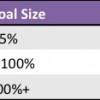Giving Should Exceed Saving?
 My church put on a financial boot camp this past weekend, the content of which largely followed Dave Ramsey’s baby steps, along with additional Biblical support for a debt-free generous lifestyle and some fun mathematical examples of the power of compound interest. But one of the volunteers mentioned a principle that he and his wife live by: his savings rate does not exceed his giving rate.
My church put on a financial boot camp this past weekend, the content of which largely followed Dave Ramsey’s baby steps, along with additional Biblical support for a debt-free generous lifestyle and some fun mathematical examples of the power of compound interest. But one of the volunteers mentioned a principle that he and his wife live by: his savings rate does not exceed his giving rate.
I admit that I was surprised to hear this come out of a financial professional’s mouth, even speaking in the context of a ministry volunteer. I had never heard or read this suggestion through years of absorbing personal finance media and several studies of what the Bible says about money.
However, it was something I had wondered about myself. We tithe and give offerings, but the total percentage of our income that we give is about five points less than what we save for retirement. Does this make us guilty of “storing up for [our]selves treasures on earth, where moth and rust destroy, and where thieves break in and steal” (Matthew 6:19)?
One reframing quote that I heard during the workshop that I appreciated was that “giving” should be thought of as “investing in the kingdom of God.” In that sense, we are investing more in our earthly treasures than we are in God’s kingdom. Is the action of investing that extra 5% for our long-term future different in some way than spending it in the now, in terms of comparing it to our giving rate?
We don’t have any plans to greatly alter our long-term savings or giving rates, but this session definitely gave me something to think about in terms of a method of evaluating our priorities.
Have you ever heard the suggestion to give more than you save? Which do you do at a higher rate, and which is accelerating faster? For those of you who don’t give close to 10%, does this sound crazy?
photo from Mr. Kris
Filed under: giving, retirement, savings

 Don’t Give Here
Don’t Give Here When to Start Saving for a Mid-Term Goal
When to Start Saving for a Mid-Term Goal All I Want for Christmas Is a Giving Revolution
All I Want for Christmas Is a Giving Revolution Why I Tithe
Why I Tithe


As an atheist, yes, this sounds crazy, but I can understand the sentiment behind it. It would be difficult for me to achieve right now since every last cent I have is accounted for (mostly going to debt) but I would love to someday be in a position to donate more than I save to an environmental organization or something similar.
Jordann @ My Alternate Life recently posted..What Training a Dog has Taught Me
Hm, I wouldn’t have thought that it would sound crazy “as an atheist,” but rather “as someone trying very hard to build wealth.” I don’t remember thinking much one way or another about tithing when I was an atheist. My motivation for giving comes from my love for God and appreciation of Jesus’s sacrifice on my behalf, yes, but also an understanding of how fortunate I am as a healthy American.
Once you’re out of debt it should be a pretty easy switch to saving or giving everything that’s been going to those payments now! The more I think about it the more amazed I am at how similar debt repayment and saving are.
This is a hard one because frankly, as prosperous Americans, we’re never really giving “enough.” I think our emphasis as Christians should be to share our wealth above building it but I’m not sure how the mechanics of that ought to work, I guess. My personal compromise is to make sure I give as much or more than I save, but neither of those comes to 10%, unfortunately. Little things – I managed to raise my giving by $20 a month recently, and I’m hoping when income gets back up I can continue raising it by that increment until it hits closer to 10%.
PS curious to hear what other views in your church group are.
I haven’t brought it up with them… And so far none have commented. Maybe I’ll ask them about it this week.
I’m surprised that any commenter holds to the principle of giving more than saving! Do you think you would still if you were able to give above 10%?
10% is kind of a widely accepted traditional tithing number, but it’s not particularly meaningful to me. I was raised in a non-religious household where my parents stressed “giving until it hurts” over any particular number, and my church stresses giving out of gratitude more generally rather than tithing specifically. Also, I spread my small amounts out over my church and one or two other charities that I think do a lot of direct good because I did that before I was religious and think it would not be very compassionate to just focus on my church alone…there’s tons of need in the world. I think if I were able to give 10% AND save 10%, I would give more, yeah.
The complication is that both giving and retirement savings are with my personal “allowance,” my husband spends similar amounts of his on student loan repayment and retirement. He is not religious or too concerned with charities, in part because he’s from a very devout family who at times went too far in that direction and had hard times meeting their own needs. This is definitely a priority difference we’ll be discussing and renegotiating in the future as our finances and goals change.
Interesting idea. I haven’t heard of it. I wonder how it applies to those who might volunteer and give their ‘time’ versus their money. Are they expected to also give the same amount of money? I think you have to factor in that consideration. I admit, I don’t give enough of either my time or money, but I do try on both ends to give some.
Money Beagle recently posted..Minor League Baseball Games Are Fun And Cheap
Speaking only from my perspective as a member of my particular church, giving money and serving (giving time) are both expected for members/people who stick around a long time.
On the general principle, I get kind of annoyed when people bring up “tithing my time” instead of tithing their money. (I’m not speaking about you but other Christians.) I don’t think you can substitute one for the other with some kind of fixed exchange rate. There is good Scriptural support for tithing (in the Old Testament) and being generous with money (New Testament) as well as abundant stories about healing, hospitality, etc. performed by Jesus and the members of the early church in the NT.
I think a good self-check is to concentrate on giving more of whatever you are more likely to keep tight-fisted. I don’t value my time very highly so it’s no big deal to me to volunteer, but I focus so much on money and we have such a tight budget that I know tithing my money is a greater act of worship than giving my time is. I might suggest this viewpoint the next time I hear someone talk about “tithing time”…
I don’t give 10% but I do firmly believe that giving is a wealth-building strategy. I gave a man on the street five dollars the other day, and the next day, I found five dollars on the sidewalk. When you surround yourself with abundance, and you practice generosity, money comes easier.
Kathleen @ Frugal Portland recently posted..On Shopping
Giving as a wealth-building strategy… I haven’t heard that one literally before. I definitely agree it has psychological benefits.
I’m not particularly religions so I do not tithe- but I do give to charities and sponsor families at Christmas, etc.
I give nowhere near what I save….so now I feel greedy after reading this =(
[email protected] recently posted..Why I’m Not Having a Garage Sale This Summer
Well, then we’re in the same boat!
In my head, I account for tithing as “any time I get an income in my bank acocunt, 10% of that goes to church.” Since I’m not counting retirement money now out of my 10% (since it doesn’t get to my bank account), in my head I plan to give 10% out of my retirement payments when they come in the distant future. If economic times are really hard when that day comes, I may not be able to make that 10%. But for now I intend on it and hope that God will help me know how much to give is “enough” at that age.
So you tithe on your net minus retirement contributions, not your gross? I suppose it’s similar to the problem that you could get into if you consider the benefits provided by our workplaces like insurance or retirement matching – that doesn’t come into your bank account but it’s the same as extra pay.
I’ve thought about how to tithe off our post-retirement income as well and haven’t resolved it. Tithe off all income, or just the growth, or not at all… I can’t imagine not giving at all!
I’ve heard of people giving more than they save, but generally they less financial obligations (house paid off, no children/empty nester) than the average person. I think the heart of the issue is generosity and sacrifice, and being generous is going look different depending on which stage of life you’re in. While giving more than saving is a great goal, I don’t think you should feel guilty for not doing it right now.
Jessica recently posted..Spending Report: June-July 2012
It’s a heart issue! You’re right on.
I don’t think this principle is confined to religious tithe *at all*. In many ways, I see my tithe as sort of a voluntary “community club” fee – I’m supporting the whole administration of the church, from providing bread/butter for the pastor and his family to running weekly activities. But the church I belong to is also enormously generous with the tithe they collect – a huge portion of the budget goes to causes in both the local community and in developing countries, plus it has wonderful counseling resources. To this extent, I think non-religious people support similar organizations and charities.
There are definitely things that we prioritize over our future savings – mainly quality food and nominal tithing. But when it comes to “above and beyond” giving, I think we have to consider what we’re going to do with the money saved. I expect we’ll tithe and be charitable with the principle balance of our retirement accounts. So that means we’ll pay tithe twice on the principle amount and once on the investment gains. Furthermore, I’d like the option of retiring early and becoming a self-supported missionary or community volunteer. I’m not saying these are excuses for only giving the minimum amount right now…. just saying there’s lots variables to consider before I decide that my current financial plan is “greedy”.
You are right that the principle shouldn’t be confined to religious-associated giving – the post went in that direction because of the context in which I heard the suggestion, the way I chose to write it up, and (at least in my observation – tell me if you disagree) the trend that people near our age demographic rarely give more than small amounts (a couple percentage points of income at most) unless they are tithing.
Our church is rather… maybe the word is showy?… in terms of emphasizing how much it gives back to the community (monetarily and time-wise) and how much money is given to overseas missions. But I’m not sure what a huge portion would be and I’d have to check the budget to see what percentage actually leaves the walls.
Hmmmm, becoming a self-supported missionary is definitely “investing in the kingdom of God” in multiple ways. I wonder though what you think about the value of community investment in this type of activity? I thought about this back when our church was doing a big adoption push. At first, my reaction was “shouldn’t these people be able to pay their own way through the adoption process if they expect to be able to raise a kid?!” but then I thought about the connection that the people who gave money toward the adoption would feel with the child. Isn’t the same thing true with missionaries – that your sending church is more invested in missions if they literally put money toward it?
I believe that we have a responsiblity to our community and our world, but that our first responsibility is to ourselves and our family. It’s like in an airplane – you have to put the oxygen mask on yourself first before you can help someone else.
Well Heeled Blog recently posted..I NEED a Car… Now, New or Used?
Certainly, but if you’re able to save for the future you’re already in a solid spot.
it sure would be nice to be able to give that much…. but i agree with the commenter above who said that the person doing this probably has few financial obligations (no kids, etc).
we do give what we can, but maintain a focus on providing our children with a bright future as well.. as parents, a big part of our obligation to the world is to ensure that our kids grow up to be stand-up contributing members of society..
i can say with confidence, however, that the brighter my own financial situation gets, the more i plan to give to charitable causes.
jefferson recently posted..Extreme Blog Makeover — The SDR Edition
Well, the person who originated this statement in my presence has young children, a mortgage, the whole nine yards. He said he and his wife used to give and save 15% but now that they have kids they’ve cut it back to 10% each.
Man this is such a noble idea! But I will just confess – I am just not strong enough to do it. My priorities of saving for retirement just get in the way. But its not without cause – I spend to plan retirement as a free financial adviser. So in a round-about way I will be giving back after all.
My Money Design recently posted..Using Royalty Free Music and Stock Photos to Create Passive Income
Interesting. Are you doing any pro bono financial advising now?
We’re currently giving more than we save but I’m not sure what that proportion will be 5 years from now.
I don’t view saving for retirement anything like that Matthew verse you mentioned. A lot of Christians do and there are other Christians out there that believe in order to be close to God you need to be poor. I’d tend to believe they’re mistaken.
Frankly, saving for retirement is pretty simple and if what you NEED to be saving to support yourself in retirement (including inflation) is MORE than what you currently give then I don’t believe there is anything wrong with that. That’s not storing any treasures up on earth…that’s simply being a wise steward so you can have the same life you have today, just 40 years from now.
Furthermore, if you are “storing up treasures” it doesn’t mean those treasures will be spent on you. Dave Ramsey’s belief is building wealth so you can GIVE more later, and I completely agree with him. Having wisdom about math and compound interest very clearly helps us understand that investing our money today and giving it to somebody 30 years from now will have a FAR greater effect than giving away that money today. Sure, you’ll help somebody today, but 30 years from now you’ll be able to help 5 people.
As with all things there should be a balance, but I’m just not a believer in what that person says. Nor am I a believer that you have to be poor to be close to God.
Jason recently posted..Stock Portfolio Analysis Service – Chaikin Portfolio Health Check
My church uses a catchphrase both for itself and as a suggestion for its parishonors: “Live sufficiently and give extravagantly.” So I don’t think it’s espousing (nor do I agree with) poverty as an advantage in becoming close to God. I wonder if retirement saving goes from sufficient at a certain percentage to storing up treasure at another, though. You’re right that building wealth can enable us to give more later, but I wouldn’t completely trade that off with giving now – that money can appreciate out in the world just as well as it can in our coffers.
We don’t tithe (as we are not religious). We don’t give 10%, but we do give some. I don’t know if I’d give more than what I’m saving, as I’d like to make sure that my family is safe as well.
Michelle recently posted..My Experience With Money
Yeah, maybe our ratio will switch up a bit once we know what we need in retirement a bit better. Right now we’re trying to save so aggressively because as soon as we get real jobs we will be behind again in terms of that higher income.
I have realise that the bible talked about giving more often than saving. The principle here is that it is the giving that increases ones returns and wealth which will lead to increased savings in the long-run.Just imagine if there had been more saving from nature than giving where will our supply come from
While I don’t disagree with you, the structure of societies written about in the Bible are quite different than today. Children were their “retirement plans.” So it’s not surprising that saving isn’t often talked about directly. There are some examples in Proverbs about saving, but many more instructions to trust God with our financial security.
[…] Giving Should Exceed Saving? on Evolving PF – Emily gives me a good reminder of why I’m glad I’m not religious. She talks about how your savings percentage should relate to your tithing amount. I guess I’m greedy. […]
[…] give. The median annual giving for an American Christian is $200 and only 4% tithe! This puts the discussion we had earlier in the week in a larger […]
[…] @ Evolving Personal Finance writes Giving Should Exceed Saving? – I recently heard the suggestion that one’s savings rate should not exceed one’s […]
I would strongly urge everyone here to read “The Life You Can Save” by Peter Singer. It had a HUGE impact on our attitudes towards giving. Not only the amount we give but also our choice of organizations. I can only imagine how much better the world might be if this were were mandatory reading for everyone. I guarantee it’ll get you thinking about your own donations!
Thank you for the recommendation. Based on what I read of Peter Singer’s in college I don’t really agree with his stance on animal rights, but maybe I’ll feel differently if he’s just talking about humans.
[…] Giving Should Exceed Saving? […]
[…] Giving Should Exceed Saving? by Evolving PF. […]
[…] Giving Should Exceed Saving? was featured in the Carnival of MoneyPros. […]